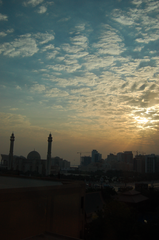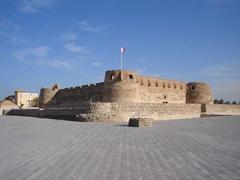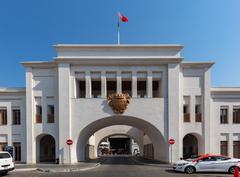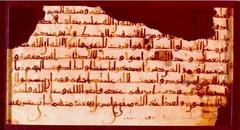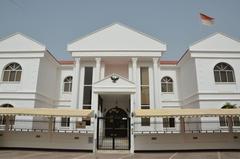Murad Majlis Visiting Hours, Tickets, and Historical Significance in Manama, Bahrain
Date: 14/06/2025
Introduction
Murad Majlis, located in the historic city of Muharraq near Manama, Bahrain, stands as a testament to the region’s illustrious pearling past and enduring social customs. Originally part of a tawwash (pearl merchant) complex, the majlis played a central role in Bahrain’s pearling economy from the late 19th to early 20th centuries. Carefully restored and integrated into the UNESCO-listed Pearling Path, Murad Majlis invites visitors to explore its architectural beauty and the rich cultural narratives that have shaped Bahrain’s social fabric (Pearling Path; Bahrain Authority for Culture and Antiquities).
This comprehensive guide offers detailed information about Murad Majlis visiting hours, ticketing, accessibility, architectural features, and its cultural significance, ensuring a rewarding and respectful visitor experience.
Table of Contents
- Origins and Historical Context
- Architectural Features and Restoration
- Visitor Information: Hours, Tickets, and Accessibility
- Social and Cultural Legacy
- The Pearling Path and UNESCO Recognition
- Community Revitalization and Contemporary Role
- Preservation Techniques and Materials
- Practical Visitor Tips
- Nearby Attractions
- Frequently Asked Questions (FAQ)
- Conclusion
- References
Origins and Historical Context
Murad Majlis, also known as Sheikh Mohammed bin Saqer Al-Moawda Majlis, was constructed as a separate structure from the main family residence to host male guests and facilitate business negotiations—an important custom within Bahrain’s pearling society (Pearling Path). The tawwash—leading intermediaries in the pearling industry—used such majlises for trade, hospitality, and community events.
Muharraq, the former capital of Bahrain and a hub for pearl trading, developed a distinctive urban fabric with neighborhoods organized around mosques and gathering places like the majlis. These spaces reflected both social stratification and communal values inherent to the pearling era (Pearling Path).
Architectural Features and Restoration
Murad Majlis exemplifies traditional Bahraini architecture, featuring graceful arches, decorative plasterwork, and open-air courtyards designed for social interaction (Evendo). The restoration prioritized authenticity by using coral stone, wood, and terrazzo—materials salvaged from historic buildings. This approach preserves the site’s historical integrity while integrating sustainable construction practices (The Design Gesture).
Key architectural highlights include:
- Wind Towers: Traditional features for passive cooling.
- Mashrabiya Screens: Latticework for privacy and ventilation.
- High Ceilings and Stucco Reliefs: Reflecting Islamic and regional influences.
- Central Courtyard: A serene space for gatherings, shaded with date palms and seating.
Restoration efforts are guided by UNESCO standards, ensuring the preservation and adaptive reuse of heritage assets (Bahrain Authority for Culture and Antiquities).
Visitor Information: Murad Majlis Visiting Hours, Tickets, and Accessibility
- Visiting Hours: Typically open Saturday to Thursday, 9:00 AM to 5:00 PM (or 6:00 PM at some venues), closed on Fridays and public holidays. Hours may vary during restoration; check the official website for updates.
- Tickets: Admission is usually free as part of the Pearling Path cultural trail. Some special exhibitions or guided tours may require tickets (generally BD1–3 per adult).
- Guided Tours: Available by arrangement through the Bahrain Authority for Culture and Antiquities or local tour operators. Tours provide in-depth historical and architectural context.
- Accessibility: Restoration includes ramps and accessible restrooms, though some areas may pose challenges due to the building’s historic nature. Advance inquiries are recommended for visitors with mobility needs.
- Facilities: Restrooms, shaded seating, exhibition spaces, and soon, a gift shop and refreshment area (Architectural Review).
Social and Cultural Legacy
The majlis was the focal point of male social life in Bahrain’s pearling era, serving as a venue for hospitality, business negotiations, and community deliberation (Evendo). It remains a living symbol of communal traditions and hospitality, with efforts to revive and sustain these practices as part of broader cultural revitalization (Pearling Path).
The Pearling Path and UNESCO Recognition
Murad Majlis is a key landmark on the Pearling Path, which was inscribed as a UNESCO World Heritage Site in 2012 under the title “Pearling, Testimony of an Island Economy” (Bahrain Authority for Culture and Antiquities). The path connects various historic sites in Muharraq, tracing the social and economic journey of Bahrain’s pearling industry and its communities (Pearling Path).
Community Revitalization and Contemporary Role
The restoration of Murad Majlis is part of a wider urban revitalization project in Muharraq, blending heritage conservation with new cultural and community spaces (The Design Gesture). The site now hosts cultural events, exhibitions, and educational programs, fostering engagement among locals and visitors.
Preservation Techniques and Materials
- Materials: Coral stone, wood, terrazzo, and traditional lime-based mortars.
- Techniques: Conservation architects and artisans employ traditional methods for structural repair, decorative plasterwork, and wood carving, ensuring historical accuracy (The Design Gesture).
- Sustainability: Passive cooling systems, such as wind towers and shaded courtyards, are restored and enhanced for environmental performance (explorecity.life).
Practical Visitor Tips
- Dress Code: Wear modest clothing covering shoulders and knees; women may need a headscarf when visiting adjacent mosques (Two Monkeys Travel Group).
- Photography: Permitted in public areas, but ask before photographing individuals or private events.
- Hydration & Sun Protection: Bring water, wear sunscreen, and consider visiting during cooler months (November to March).
- Footwear: Comfortable shoes are recommended for walking on cobblestone streets.
- Currency: Bahraini Dinar (BHD); credit cards widely accepted, but carry cash for small purchases (Blue Bay Travel).
Nearby Attractions
- Siyadi Majlis and Siyadi House: Further along the Pearling Path.
- Manama Souq: Traditional shopping and street food (Almosafer).
- Bahrain National Museum: In-depth exhibitions on Bahrain’s history (Two Monkeys Travel Group).
- Qal’at al-Bahrain (Bahrain Fort): UNESCO World Heritage Site nearby (Blue Bay Travel).
Frequently Asked Questions (FAQ)
Q: What are the visiting hours for Murad Majlis?
A: Usually Saturday to Thursday, 9:00 AM to 5:00 or 6:00 PM. Closed Fridays and public holidays. Confirm on the official website before visiting.
Q: How much is admission?
A: Generally free, but some special exhibitions or tours may require a ticket (BD1–3 per adult).
Q: Are guided tours available?
A: Yes, and highly recommended. Book in advance through the Pearling Path administration.
Q: Is Murad Majlis accessible for visitors with disabilities?
A: Restoration includes accessibility features, but some historic areas may be challenging. Contact the site in advance for specific needs.
Q: Can I take photographs inside Murad Majlis?
A: Yes, in public areas, but always ask for permission when photographing people or during private events.
Q: What’s the best time of year to visit?
A: November to March, when temperatures are cooler.
Conclusion
Murad Majlis stands as a vibrant emblem of Bahrain’s pearling heritage, offering visitors a unique opportunity to connect with the island’s storied past through immersive architecture and living traditions. Plan your visit by checking the latest information on visiting hours and guided tours, respect local customs, and explore additional heritage sites along the Pearling Path for a holistic cultural experience.
Stay updated via the official Pearling Path website and the Bahrain Authority for Culture and Antiquities. For real-time updates and cultural insights, download the Audiala app and follow Bahrain’s cultural channels on social media.
References and Further Reading
- Murad Majlis Visiting Hours and History: Exploring Muharraq’s Pearling Heritage, 2025, Bahrain Authority for Culture and Antiquities (Pearling Path)
- Visiting the Murad Majlis: Hours, Tickets, and Cultural Significance in Manama, 2025, Pearling Path (Pearling Path)
- Architectural Features and Restoration Efforts, 2025, explorecity.life (explorecity.life)
- Murad Majlis Visiting Hours, Tickets, and Guide to Muharraq’s Historic Site, 2025, News of Bahrain (News of Bahrain)
- Pearling Path, UNESCO World Heritage, 2012, Bahrain Authority for Culture and Antiquities (Bahrain Authority for Culture and Antiquities)
- Fact Magazine, A Slice of History, 2025 (Fact Magazine)
- The Design Gesture, Bahrain’s Muharraq Revitalization, 2025 (The Design Gesture)
- Blue Bay Travel, Guide to Manama, 2024 (Blue Bay Travel)
- Bahrain Confidential (Bahrain Confidential)
- Two Monkeys Travel Group (Two Monkeys Travel Group)
- Architectural Review (Architectural Review)
- Almosafer (Almosafer)
